
Bernadeth Atrinindarti
MAppSc (Advanced Nutrition Practice)
Note — The article was checked and updated March 2024.
Intermittent fasting has been a part of our evolution not by choice, but due to circumstances – our ancestors would only eat, forage and hunt during daylight. That meant at least 10-12 hours daily of fasting, and quite often they were without food for much longer.
Perhaps, we too should be “counting hours” till our next meal instead of calories, if we are to stay healthier for longer, and extend our healthspan.
What is intermittent fasting?
Intermittent fasting is an approach to eating where there is a cycle between eating and fasting periods.
Intermittent practices have been performed for thousands of years, through many different ages and as a part of several civilizations due to religious, spiritual, and cultural reasons.
This has continued till this day, but we now also have a modern approach to intermittent fasting due to different health reasons and benefits.
RELATED — Intermittent Fasting: The Medicine of Old
Modern intermittent fasting can be divided into:
- Time-restricted eating (TRE) patterns
- Alternate day fasting (ADF) with or without caloric restriction
- Fasting-mimicking diet (FMD)

Time-restricted eating (TRE) is an eating pattern that involves periods of eating and fasting, typically within a certain time window. The most known TRE is 16/8 which refers to 16 hours fasting and 8 hours consuming foods.[1]
Alternate-day fasting comprises an alternating pattern between non-restricted days and fasted days with no caloric or severely restricted calorie intake.
The most common version is where we consume around 500 calories (about 25% of calories needed) on the fasted day, and then alternate with eating ad libitum (as desired) on feed day.[2]
The fast-mimicking diet involves a period of limiting caloric intake while providing essential nutrients such as vitamins and minerals. The common strategy is to fast 2-7 days every few weeks to a few times a year, depending on the goals and needs.
Health benefits on intermittent fasting - current research and studies
Many studies on animals and humans showed that intermittent fasting could help improve health conditions such as
- Diabetes
- Obesity
- Cardiovascular disease
- Cancers
- Neurological disorders[3]
In this article, we’ll discuss more in-depth the data and research available on intermittent fasting and its effect on health and whether it is suitable for you.
Weight loss
Reducing caloric intake is most widely known to be effective for weight loss, which is one of the reasons why intermittent fasting has gained popularity.
Research that observed the effect of a 12-week alternate day fasting (ADF) group showed a significant body weight and fat mass reduction compared to the control group.[4]
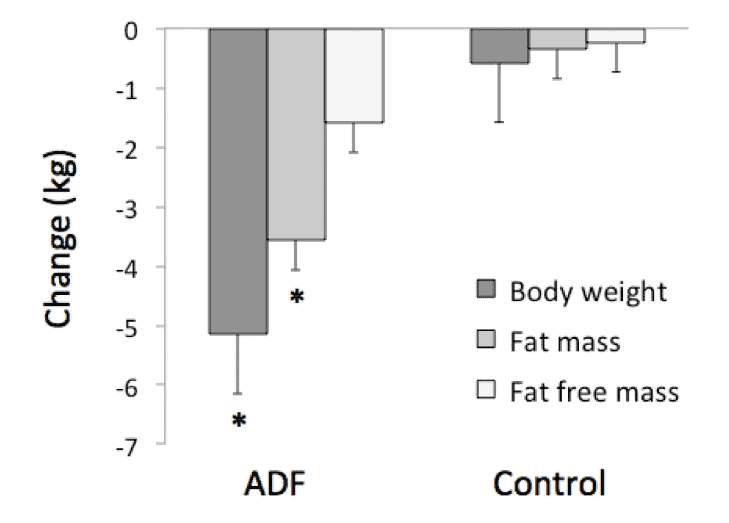
Source: Varady, K.A. Alternate day fasting for weight loss in normal weight and overweight
subjects: a randomized controlled trial. (2013)
Another study reported that alternate-day fasting (ADF) and 16/8 time-restricted fasting (TRE) for 3 weeks also showed significant body weight loss.
Intermittent fasting helps with weight loss
The ADF was instructed to consume 600 kcal on fasting days and the usual diet on eating days. The TRE group were free to arrange their calorie intake in the 8-hour eating window, according to the Chinese Dietary Reference Intakes which was estimated based on gender and the level of physical activity.[5]
The ADF group showed more significant body weight reduction compared to the 16/8 TRF group.
Overall, intermittent fasting has showed to induce weight loss in many human studies, but it’s still unclear whether it’s beneficial to help weight reduction in the long run.[6]
Type 2 Diabetes
Obesity plays a major role in up to 79% of type 2 diabetes cases. Intermittent fasting has been proposed as an effective approach to reducing weight with additional cardiometabolic benefits in overweight or obese individuals.[7]
Research that observed the effect of intermittent fasting on glycaemic control in patients with type 2 diabetes instructed the participants to eat 500-600 kcal for 2 non-consecutive days. The participants could follow their usual diet for the other 5 days.
The study reported that after 12 months the mean HbA1c level decreased significantly.[8]
RELATED — Diabetes: Early Signs, Causes, Types and Treatment
A different study focusing on the effect of intermittent fasting and glucose and insulin showed a reduction in glucose by 3-6% over the course of 8-12 weeks in people with prediabetes. The participants were randomized to the ADF group (35% calorie intake) and the control group (no restriction).[9]
Furthermore, fasting insulin in the intermittent fasting group was also decreased by 20-31% after 8-12 weeks of intervention. Reductions in insulin levels are most likely related to the restriction of calories and amount of weight loss.[9]
Cardiovascular health
Research has found that incorporating fasting into our routine may be especially beneficial when it comes to heart health.
A study by Bhutani et al. showed that after 8 weeks of alternate-day fasting the low-density lipoprotein (LDL) level was reduced to 72 mg/dl from baseline (106 mg/dl).
This reduction might be related to the decrease in body weight and waist circumference. Also, triacylglycerol concentrations reduced from 136 mg/dl to 88 mg/dl after 8 weeks of diet.[10]
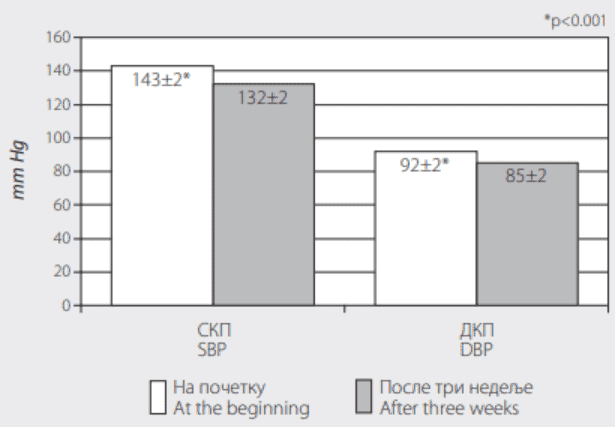
Source: Beleslin, B. The effects of three-week fasting diet on blood pressure, lipid profile and glucoregulation in extremely obese patients. (2007)
Intermittent fasting may improve cholesterol levels
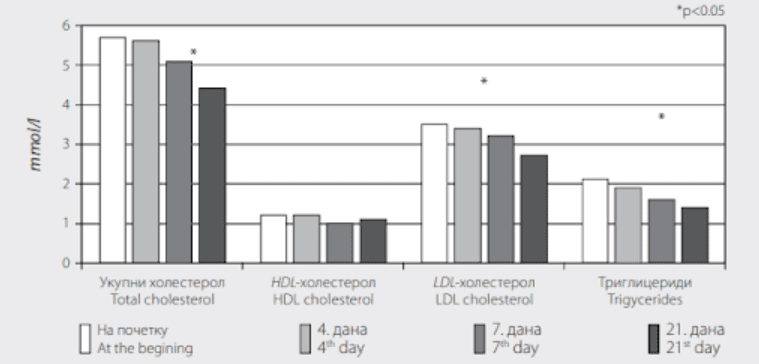
Another study in 110 obese adults showed that after fasting for three weeks under medical supervision, there was a significant decrease in blood pressure, as well as levels of blood triglycerides, total cholesterol and LDL cholesterol.[11]
Cancer
A study conducted to see the effects of a fasting-mimicking diet (FMD) in people diagnosed with cancer for the first time showed
- reduced blood glucose levels by 18.6%
- blood insulin levels by 50.7%
- insulin-like growth factor 1 (IGF-1) levels by 30.5%
It’s important to note that these three markers are linked to a higher risk of cancers.
The participants were instructed to do a five-day FMD with 600 kcal on day 1 and 300 kcal on days 2-5 followed by 16 to 23 days of refeeding.[12]
In addition, there were also differences in the activated immune marker genes, meaning that the immune system started to recognise cancer as a pathogen.[12]
A study in mice showed that a combination of fasting and chemotherapy results in 20-60% cancer-free survival compared to chemotherapy or fasting alone.
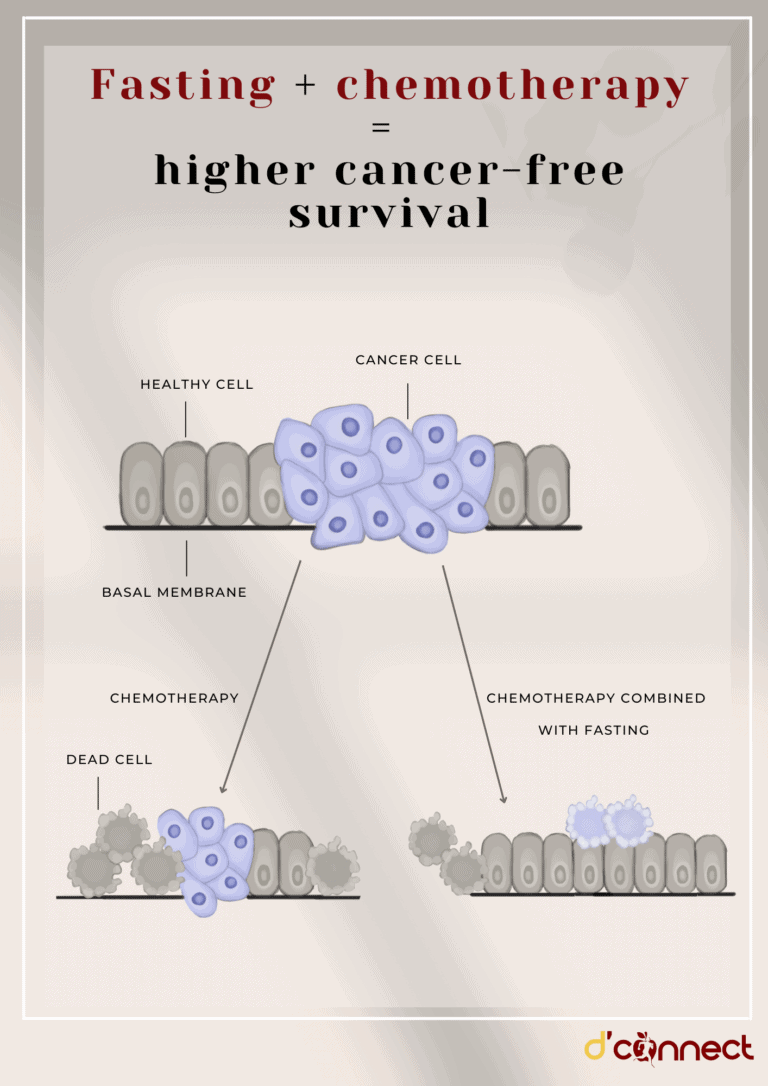
Intermittent fasting and chemotherapy combined together might provide better results
However, more research is needed to clearly determine the effect of fasting on cancer treatment.[13]
Neurological disorders
Intermittent fasting might potentially be effective to support or prevent neurological diseases related to
- Metabolic
- Cellular
- Circadian rhythm
A study by Hartman was looking into the effect of intermittent fasting on children with epilepsy. This study found improvements in patients’ seizures in the range of a 50-99% reduction.[14]
Another study conducted on primates with Parkinson’s disease reported reduced motor deficiencies and managed dopamine depletion. Dopamine degeneration is one of the main causes of Parkinson’s disease which leads to progressive motor dysfunction.[15]
In a series of case reports, a lifestyle intervention that included daily short-term fasts was able to significantly improve Alzheimer’s symptoms in 9 out of 10 people.[15]
Intermittent fasting also shows to have a positive effect on depression and anxiety. A study by Martin in healthy men and women showed that 25% caloric restriction for 104 weeks could have significant improvement in the depression score, tension and general health.
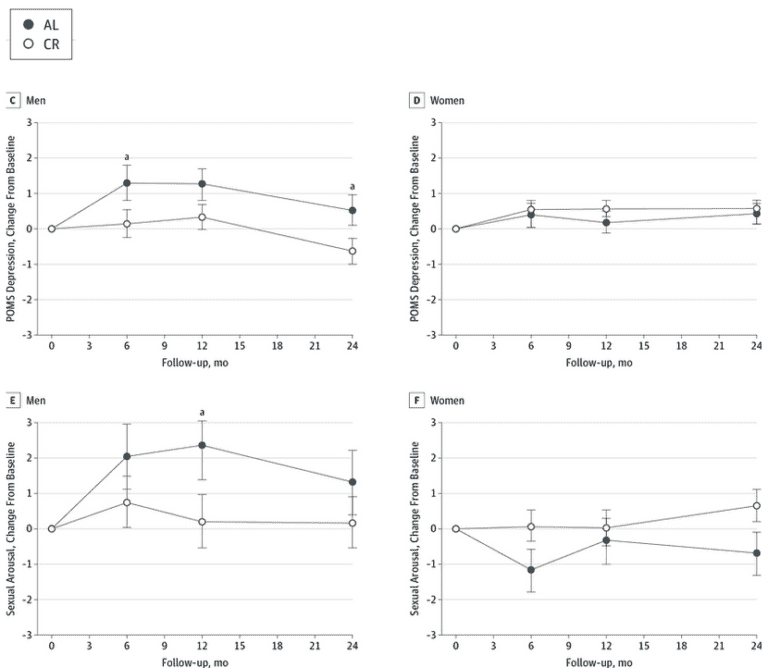
AL - ad libitum (eating at one's pleasure) CR - caloric restriction
Source: Martin CK. Effect of Calorie Restriction on Mood, Quality of Life, Sleep, and Sexual Function in Healthy Nonobese Adults: The CALERIE 2 Randomized Clinical Trial. (2016)
However, more research is still needed to determine the effect of intermittent fasting on neurological diseases.
Longevity
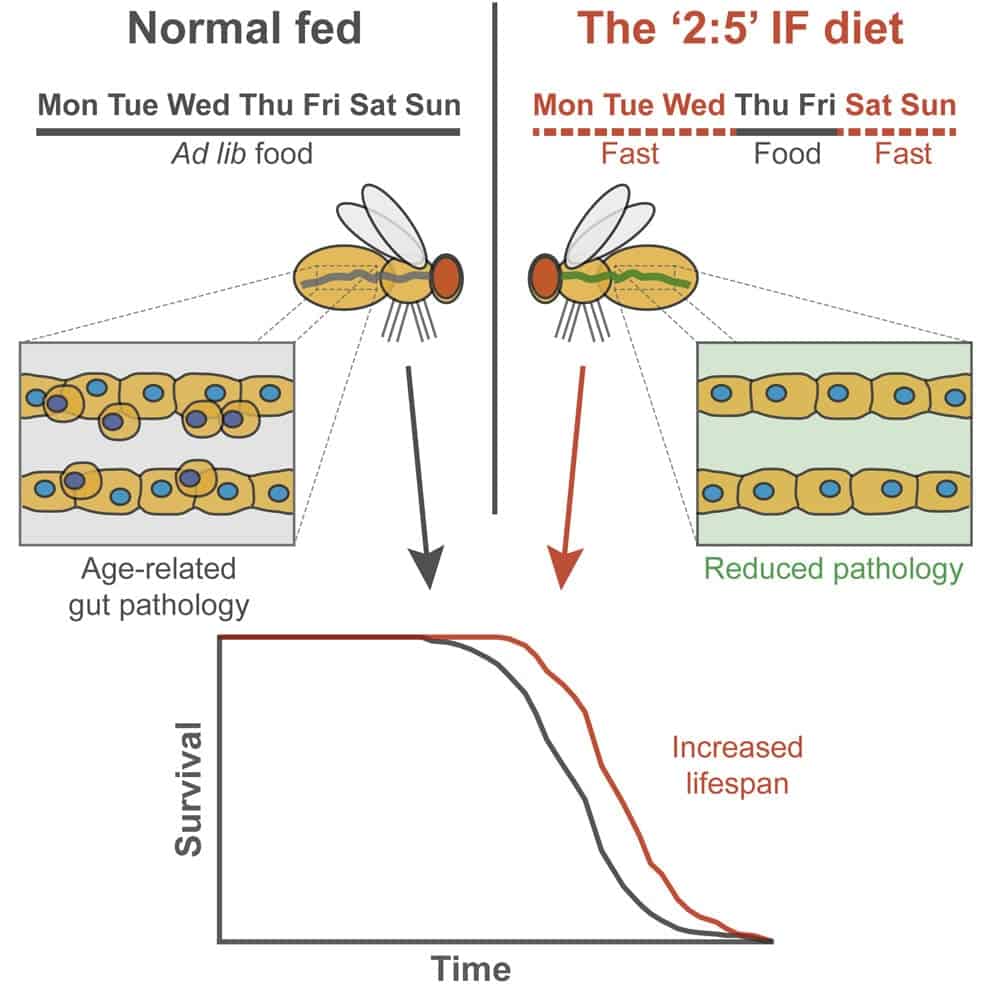
Source: Catterson, J.H. Short-Term, Intermittent Fasting Induces Long-Lasting Gut Health and TOR-Independent Lifespan Extension. (2018)
Comprehensive data available from 1934 to 2012 research showed that caloric restriction increases lifespan by 14-45% in rats and 4-27% in mice.[17]
A study by Mitchell et al. reported that time-restricted feeding has been shown to have a protective effect against diet-induced metabolic diseases.[18]
A fasting-mimicking diet (FMD) was conducted on 100 healthy participants and showed to reduce multiple risk markers for age-related diseases such as lower
- body weight
- body fat
- blood pressure
- glucose, triglycerides and cholesterol[19]
Intermittent fasting might increase life expectancy
These findings show the potential effect of periodic fasting, fasting-mimicking diets for the extension of healthspan and also “youth span” or the range of time in which an organism remains healthy and fully functional.[20]
Related Questions
1. Who should avoid intermittent fasting?
Intermittent fasting can be a triggering factor for people with eating disorders such as bulimia or binge eating and might cause adverse effects on their health.
RELATED — Understanding Eating Disorders: History, Types and Statistics
Pregnant or breastfeeding women should avoid fasting since it is important to eat often during the day to fulfill the energy required for them and the baby.
Also, individuals with diabetes need to maintain stable blood sugar levels to stay healthy, and with intermittent fasting they can achieve extremely low blood sugar levels, which might be dangerous.
2. What does intermittent fasting do to female hormone levels?
Intermittent fasting might be related to a decrease in the hormone estrogen level which may affect fertility and the ability to conceive.
3. How long should I fast for my age?
Intermittent fasting experience is individual and different types of fasting will suit different people.
It is best to talk to a health professional for the safest option according to your health conditions and diet history.
4. Is intermittent fasting advisable for women in menopause?
Intermittent fasting can help with the menopause symptoms such as decreased sex hormones, insulin resistance and slowed down metabolism.
RELATED — Menopause Revealed: Signs, Stages, Types and Treatment
5. Can I exercise while I’m fasting?
Yes, you can exercise while doing intermittent fasting.
However, it is essential to safely manage the timing and listen to your body. It is better to consider low-intensity workouts on the fasting day and eat meals close to moderate or high-intensity exercises.
Are you currently trying out intermittent fasting? If so, let us know in the comments below if it’s working for you, and if you have experienced any health benefits.
Bernadeth’s passion in cooking, food and health led her to learn more about nutrition and the importance of functional foods. As a nutritionist, Bernadeth’s goal is to encourage a healthy-balanced diet and share the evidence-based nutrition knowledge in order for people to live healthier and longer lives…
If you would like to learn more about Bernadeth, see Expert: Bernadeth Atrinindarti.
References
(1) Regmi, P., & Heilbronn, L. K. (2020). Time-Restricted Eating: Benefits, Mechanisms, and Challenges in Translation. iScience, 23(6), 101161. https://doi.org/10.1016/j.isci.2020.101161
(2) Mandal, S., Simmons, N., Awan, S., Chamari, K., & Ahmed, I. (2022). Intermittent fasting: eating by the clock for health and exercise performance. BMJ open sport & exercise medicine, 8(1), e001206. https://doi.org/10.1136/bmjsem-2021-001206
(3) Effects of Intermittent Fasting on Health, Aging, and Disease. (2020). New England Journal of Medicine, 382(3), 298-298. https://www.nejm.org/doi/full/10.1056/NEJMx190038
(4) Varady, K.A., Bhutani, S., Klempel, M.C. et al. (2013) Alternate day fasting for weight loss in normal weight and overweight subjects: a randomized controlled trial. Nutr J 12, 146 . https://doi.org/10.1186/1475-2891-12-146
(5) CHAIR, Sek Ying, et al. (2022) Intermittent Fasting in Weight Loss and Cardiometabolic Risk Reduction: A Randomized Controlled Trial. Journal of Nursing Research. Volume 30 – Issue 1, https://journals.lww.com/jnr-twna/fulltext/2022/02000/intermittent_fasting_in_weight_loss_and.3.aspx
(6) Welton, S., Minty, R., O’Driscoll, T., Willms, H., Poirier, D., Madden, S., & Kelly, L. (2020). Intermittent fasting and weight loss: Systematic review. Canadian family physician Medecin de famille canadien, 66(2), 117–125. https://pubmed.ncbi.nlm.nih.gov/32060194/
(7) Emily Borgundvaag, Jessica Mak, Caroline K Kramer. (2021)Metabolic Impact of Intermittent Fasting in Patients With Type 2 Diabetes Mellitus: A Systematic Review and Meta-analysis of Interventional Studies, The Journal of Clinical Endocrinology & Metabolism, Volume 106, Issue 3, Pages 902–911, https://doi.org/10.1210/clinem/dgaa926
(8) Carter S, Clifton PM, Keogh JB. (2018) Effect of Intermittent Compared With Continuous Energy Restricted Diet on Glycemic Control in Patients With Type 2 Diabetes: A Randomized Noninferiority Trial. JAMA Netw Open;1(3):e180756. https://jamanetwork.com/journals/jamanetworkopen/fullarticle/2688344
(9) Adrienne R. Barnosky, Kristin K. Hoddy, Terry G. Unterman, Krista A. Varady. (2018) Intermittent fasting vs daily calorie restriction for type 2 diabetes prevention: a review of human findings. Translational Research. Volume 164, Issue 4,Pages 302-311, ISSN 1931-5244. https://www.sciencedirect.com/science/article/abs/pii/S193152441400200X
(10) Bhutani, S., Klempel, M.C., Berger, R.A. and Varady, K.A. (2010), Improvements in Coronary Heart Disease Risk Indicators by Alternate-Day Fasting Involve Adipose Tissue Modulations. Obesity, 18: 2152-2159. https://doi.org/10.1038/oby.2010.54
(11) Beleslin, B., Cirić, J., Zarković, M., Vujović, S., Trbojević, B., & Drezgić, M. (2007). The effects of three-week fasting diet on blood pressure, lipid profile and glucoregulation in extremely obese patients. Srpski arhiv za celokupno lekarstvo, 135(7-8), 440–446. https://doi.org/10.2298/sarh0708440b
(12) Claudio Vernieri, Giovanni Fucà, et al. (2022). Fasting-Mimicking Diet Is Safe and Reshapes Metabolism and Antitumor Immunity in Patients with Cancer. Cancer Discov; 12 (1): 90–107. https://doi.org/10.1158/2159-8290.CD-21-0030
(13) Longo, Valter D., & Mattson, Mark P. (2014). Fasting: Molecular Mechanisms and Clinical Applications. Cell Metabolism, 19(2), 181-192. https://www.cell.com/cell-metabolism/fulltext/S1550-4131(13)00503-2
(14) Hartman, A. L., Rubenstein, J. E., & Kossoff, E. H. (2013). Intermittent fasting: a “new” historical strategy for controlling seizures?. Epilepsy research, 104(3), 275–279. https://doi.org/10.1016/j.eplepsyres.2012.10.011
(15) Maswood, N., Young, J., Tilmont, E., Zhang, Z., Gash, D. M., Gerhardt, G. A., Grondin, R., Roth, G. S., Mattison, J., Lane, M. A., Carson, R. E., Cohen, R. M., Mouton, P. R., Quigley, C., Mattson, M. P., & Ingram, D. K. (2004). Caloric restriction increases neurotrophic factor levels and attenuates neurochemical and behavioral deficits in a primate model of Parkinson’s disease. Proceedings of the National Academy of Sciences of the United States of America, 101(52), 18171–18176. https://doi.org/10.1073/pnas.0405831102
(16) Hwangbo, D. S., Lee, H. Y., Abozaid, L. S., & Min, K. J. (2020). Mechanisms of Lifespan Regulation by Calorie Restriction and Intermittent Fasting in Model Organisms. Nutrients, 12(4), 1194. https://doi.org/10.3390/nu12041194
(17) Swindell W. R. (2012). Dietary restriction in rats and mice: a meta-analysis and review of the evidence for genotype-dependent effects on lifespan. Ageing research reviews, 11(2), 254–270. https://www.ncbi.nlm.nih.gov/pmc/articles/PMC3299887/
(18) Mitchell, S. J., Bernier, M., Mattison, J. A., Aon, M. A., Kaiser, T. A., Anson, R. M., . . . de Cabo, R. (2019). Daily Fasting Improves Health and Survival in Male Mice Independent of Diet Composition and Calories. Cell Metabolism, 29(1), 221-228.e223. https://www.cell.com/cell-metabolism/fulltext/S1550-4131(18)30512-6
(19) Wei, M., Brandhorst, S., Shelehchi, M., Mirzaei, H., Cheng, C. W., Budniak, J., Groshen, S., Mack, W. J., Guen, E., Di Biase, S., Cohen, P., Morgan, T. E., Dorff, T., Hong, K., Michalsen, A., Laviano, A., & Longo, V. D. (2017). Fasting-mimicking diet and markers/risk factors for aging, diabetes, cancer, and cardiovascular disease. Science translational medicine, 9(377). https://doi.org/10.1126/scitranslmed.aai8700
(20) Longo, V.D., Di Tano, M., Mattson, M.P. et al. (2021). Intermittent and periodic fasting, longevity and disease. Nat Aging 1, 47–59. https://doi.org/10.1038/s43587-020-00013-3






